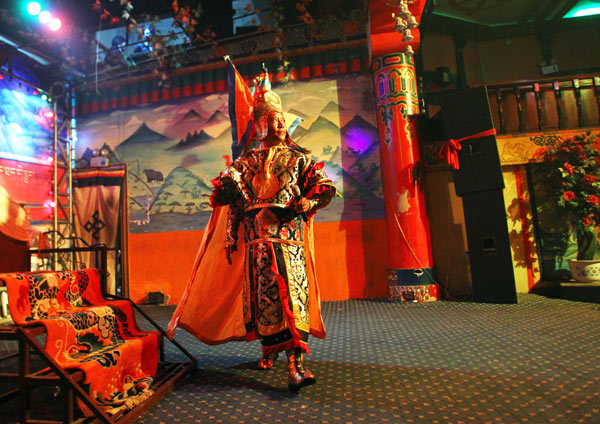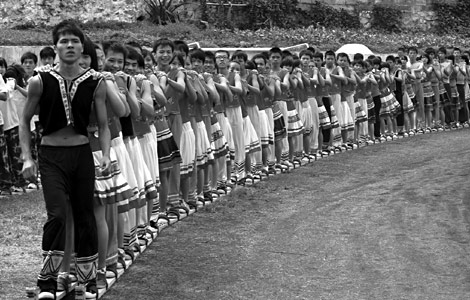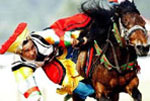|
|||||||||||
 |
|
Storyteller Tsering Dradul of the Nagqu Popular Arts Center is at performance in Nagqu, Southwest China's Tibet autonomous region, July 23, 2011. [Photo by Zou Hong / China Daily] |
Storytelling is an art for a select few in Nagqu who ensure the many adventures of the Tibetan hero King Gesar will never be forgotten. Tan Hongkai learns more.
In the dimly lit hall of Nagqu Popular Arts Center dozens of Tibetan youngsters dance to Lady Gaga's Poker Face, moving clockwise in circles, before taking a drink break. From a side room, Parga emerges, then Tsering Dradul, dressed in what appear to be warriors' costumes. The helmets have triangle-shaped banners, in a rainbow of colors. On the wall behind, at the arts center in Nagqu, the largest prefecture of the Tibet autonomous region, 4,436 meters above sea level, is a hand-painted thangka of King Gesar, dressed for combat, sword in hand, and riding a red horse.
Storyteller Tsering Dradul launches into a story about the Tibetan hero, half-singing, half-talking, using his hands to emphasize points in the story - while the Tibetan youngsters listen attentively.
For Parga, Tsering Dradul and the other 65 King Gesar storytellers the center has certified, this is a daily routine aimed at sustaining storytelling as a traditional Tibetan art form.
Two white signs at the entrance to the arts center indicate that this is a government-sponsored base for the promotion of Gesar storytelling. The epic tale is popular in Nagqu, which is famed for its storytellers.
Forty-three-year-old Tsering Dradul is the only storyteller employed by the government and says this makes him proud because he is paid to do the thing he loves most.
"The performance hall is popular with the townspeople," explains Sonam Wangdu, who is in charge of the arts center. "Everyone loves the stories, whether they are young or old."
"The artists always choose the most dramatic and comic episodes of the stories and audience members can also choose their own favorites."
"As long as they have the microphone in their hands they have the energy and enthusiasm to continue for three days and nights, non-stop," he claims.
Tsering Dradul boasts that a story about the war between the Hor and Ling states took him three months to tell, at a performance in Amdo.
But he does not read from a book. And he maintains this has nothing to do with his powers of recall.
"I couldn't read or write my name when I was 18," Tsering Dradul confesses. "Even today, I can only read and write as well as a second-grader."
 |
|
Storytellers recall King Gesar's adventures in Nagqu, Tibet autonomous region, in July 2011. [Photo by Zou Hong / China Daily] |
"I can tell around 170 to 180 stories," Tsering Dradul comments. "But once in a while, new stories occur to me in dreams. Given that, who knows how many more stories there are to come?"
Parga says he too is occasionally inspired by dreams and adds that being a storyteller is a lifelong process. "Once a story is born, it is never forgotten."
Tsering Dradul says he was inspired to become a storyteller, aged 13, when he was a shepherd, and had a month-long dream.
The flock returned home, without Tsering Dradul.
"Community leaders sent out lots of people to search for me," he recalls. "But the searches were in vain."
"My parents thought I might have drowned in a pond, or been devoured by a bear. After a month they gave up."
It was only then that he woke from his dream, finding himself in a cave near his home.
He says his dream was about a bald man in religious robes who revealed to him his fate of becoming a storyteller retelling King Gesar's adventures.
Back at home, after three days of rest, he continued to dream, this time of people dressed in white robes on white horses.
"They were giving me something like mnemonic rhymes to recall the stories."
Yet he was prohibited from demonstrating his capabilities to outsiders, because of the strict ban on "superstition" at the time.
Everything changed when he was 16. His talent was reported to the authorities and he was invited to the Tibet Autonomous Region's Academy of Social Sciences, which had been soliciting recordings about King Gesar.
"I spent almost a year there, recording my stories," he says. "Until, in 1987, at a national symposium on Gesar, in Lhasa, a deputy magistrate of our prefecture told me that since I am from Nagqu, I should be based there."
Thus began his career as a storyteller at Naqgu Popular Arts Center.
At a 1991 national symposium on Gesar in Beijing, Tsering Dradul was honored as a master storyteller, becoming a government employee soon thereafter.
The 41-year-old Parga's story is similar in many respects, except that he was "enlightened" at 7. In his dream an old man with a white beard and hair tested him.
"He told me that if I could tell him the names and features of all the mountains in the world, I would be authorized to tell the stories of King Gesar and become the best storyteller," Parga says.
"I told him, with perfect precision, the name and characters of each mountain we flew over. After which, he presented me with a five-color Hada, saying, 'You are a storyteller sent by heaven.'"
Parga's most treasured asset is his "god-sent" voice, which was recognized at a competition in 2004 for Gesar storytellers from Qinghai, Tibet and Inner Mongolia autonomous regions.
In 2006 he was awarded the honor of having "the most pleasant voice to listen to" at the World Gesar Conference in Qinghai.
"My voice is a gift from the Hindu god Bahma," Parga believes.
Uniquely, Parga can tell the story of general Danmar's adventure to fetch a coral tree.
"I am the only person capable of telling this one," Parga says proudly. "And a book has been published on it."
He has been working at Nagqu Popular Arts Center since 1998, and along with Tsering Dradul, he has been performing and discovering fresh young storytelling talents.
There is a standard formula for recording their works followed by all storytellers. First off, they record the stories on cassettes, the stories are sorted and edited by Gesar researchers, and then published in electronic or print forms.
There is just one exception to this - Sita Dorje.
The 21-year-old from Banbar, Chamdo prefecture, first demonstrated his storytelling arts at 9, after he fell into a dream, during which he was asked to eat a stack of books about Gesar.
Sita Dorje was admitted to University of Tibet last year, where he is studying history and the Tibetan language.
As the first "god-enlightened" Gesar storyteller to receive a higher education, Sita Dorje wants to make a difference. Instead of recording, he wants to write down his stories and aims to publish his first book in three years.
"I am now focusing on Tibetan grammar and writing," he says.
Apart from playing soccer with his classmates, Sita Dorje largely keeps himself to himself.
"I'm not interested in TV, celebrities and suchlike," he declares. "They may distract me. I have placed my future in the hands of Gesar."
Self-discipline, says Parga, is a virtue all storytellers should observe. As King Gesar's message is of promoting peace, sympathy and equality, artists should try to set a moral example, Parga adds.
"In pastoral areas, people treat us like Living Buddhas," he says. "You can't let them down."
He claims never to have killed a single living thing, does not lie, drink, or smoke.
"My only weakness is this," he says, fetching out a small plastic bottle from inside his brown robe. "I tried snuff out of curiosity when I was young, and became addicted."
"This might be a karmic effect from my previous life. But I'm trying to reduce. Hopefully I can give it up someday."
Meanwhile, Tsering Dradul is considering adding music to go with his King Gesar tales; and Parga has a dream of turning the story into a work of theater.
"If television can make literary classics like Heroes of the Marshes and Investiture of the Gods into the talk of the town," Parga says. "Why not King Gesar?"
Hot Topics
Libya conflict, Gaddafi, Oil spill, Palace Museum scandal, Inflation, Japan's new PM, Trapped miners, Mooncake tax, Weekly photos, Hurricane Irene
Editor's Picks

|

|

|

|

|

|







